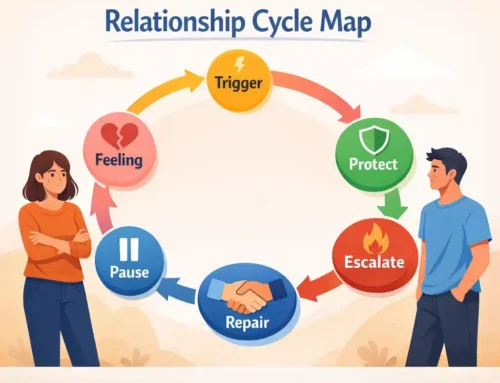
Approx. read time: 8.8 min.
Post: Rebuilding Intimacy 15 Proven Steps When Life Is Chaotic
When everything around you feels chaotic—work stress, health scares, parenting, money pressures—intimacy can slip to the bottom of the list. The paradox? Learning how to rebuild intimacy in the storm often becomes the anchor that steadies both of you. This isn’t only about sex. It’s emotional closeness, safe touch, shared meaning, and feeling like you’re on the same team—especially when life is loud.
Below is a practical, research-informed roadmap to help you rebuild intimacy now, not “when things calm down.”
🧭 Why Rebuilding Intimacy Matters When Life Is Chaotic
When work, health, parenting, or money feel overwhelming, intimacy is often the first casualty. Yet rebuilding intimacy in hard seasons is exactly what steadies a relationship. It restores safety, softens stress responses, and helps you act like a team again. Research shows simple, consistent connection rituals (like brief daily touch or check-ins) measurably reduce stress and improve relationship satisfaction—small actions with outsized impact.
🪙 Name the Distance—Without Blame (Start Here)
Rebuilding intimacy begins with honest, non-blaming language:
-
“I feel like we’ve both been in survival mode. I miss us.”
-
“We’ve been disconnected. I want us to find our way back.”
You’re describing a pattern, not attacking a person. This opens a safe door to talk about needs and next steps. Keep it brief, kind, and specific. This opens the door to connection without putting anyone on trial. It’s the first step in how to rebuild intimacy: align on the problem, not on blame. Research on “turning toward” shows that recognizing small bids for connection is foundational to closeness.
🧠 Practice Emotional Honesty (No Fixing Required)
In chaos, emotions run high. Share what’s inside, without expecting solutions:
-
“I’m overwhelmed and shutting down.”
-
“I’m anxious about money; it affects how present I am.”
Ask for the response you need: “Can you just listen?” Clarity transforms confiding into connection. Rebuilding intimacy thrives on safe disclosure, not perfect answers.
In the Gottman Method, couples use a daily “stress-reducing conversation” to debrief outside stressors without problem-solving or criticism, which deepens emotional intimacy.
⏱️ Stop Waiting for the “Right Time” (Micro-Moments Win)
The “when things settle” window may never arrive. Insert intimacy into the mess: hug while dinner simmers, hold hands in traffic, share a 2-minute recap at bedtime. The Gottman method recommends dedicating just a few intentional hours per week across greetings, partings, appreciation, and date time—consistency beats intensity. Intimacy isn’t something you postpone until life cooperates. It’s built in the middle of the mess. Couples who “turn toward” small bids in everyday moments fare better long-term.
🤝 Rebuilding Intimacy With Low-Pressure Touch
Start with comfort, not performance: a 20-second hug, a back rub, sitting with legs touching, a slow kiss. Affectionate touch increases oxytocin and can buffer stress; even simple hand-holding reduces neural threat responses—especially in supportive relationships. This is biology on your side while you’re rebuilding intimacy
💬 Listen Like a Teammate (Not a Technician)
When your partner shares, your job is space-making, not fixing.
Try this three-step loop:
-
Reflect: “So you’re worried about your mom’s health.”
-
Validate: “That makes sense; it’s a lot.”
-
Ask: “Do you want ideas or just a hug?”
Feeling seen is intimacy. Most problems don’t need advice; they need understanding first.
👂 Listen the Way Love Needs (Not to Fix)
When your partner opens up, your job is to make emotional space:
-
Don’t interrupt.
-
Don’t advise unless asked.
-
Reflect and validate: “That sounds heavy. I’m here.”
This mirrors the rules of the stress-reducing conversation: each partner gets dedicated airtime about external stress, with empathy, not solutions.
📡 Turn Toward “Bids for Connection”
Partners send constant tiny “bids” (jokes, sighs, invitations). Rebuilding intimacy means catching and turning toward those bids—eye contact, a quick response, a question back. Couples who reliably turn toward each other’s bids are far more likely to stay satisfied and together. Make a game of spotting and answering at least 5 bids today.
☕ Daily Rituals That Anchor You (Simple, Repeatable, Real)
Create two small rituals of connection you can keep even on rough days:
| Ritual | What to Do | Time Needed |
|---|---|---|
| Morning Parting | Before leaving, share one stressor & ask: “How can I support you?” | 60–90 sec |
| Evening Reunion | 6-second kiss + 2 minutes each to debrief highs/lows (no problem-solving) | 5–6 min |
| Bedtime Check-In | One appreciation + one hope for tomorrow | 2–3 min |
These are evidence-informed habits recommended in Gottman-style frameworks; they’re short, sticky, and powerful for rebuilding intimacy.
💌 Reignite Curiosity (Beyond Logistics)
Stress shrinks conversations to chores. Bring back curiosity:
-
“What’s been on your mind we haven’t talked about?”
-
“What kind of touch feels best lately?”
-
“If we tried one new thing together next month, what would it be?”
Curiosity makes partners feel valued—fuel for rebuilding intimacy day by day.
🧰 Use Conflict as a Doorway (Not a Wall)
Fighting isn’t failure; avoidance is. In conflict, share impact not accusation (“I felt alone when you stayed late”), take brief breaks if needed, and always return to finish. End with a repair phrase: “We’re on the same side.” Repair attempts are core to long-term stability. (Search “repair attempts” and “softened startup” for helpful scripts.)
🎯 Make a 6-Hour Weekly Investment (You Can Do This)
Aim for ~6 hours a week of intentional connection, spread across:
-
Daily rituals: 10–20 minutes/day.
-
Stress-reducing conversations: 10 minutes each, 3–4x/week.
-
Date time: 1–2 hours/week.
-
Affection: 6-second kiss + 20-second hug daily.
This compact “portfolio” reliably supports rebuilding intimacy even during chaos.
🛟 Talk About Sex—Gently, Clearly, Without Pressure
Sex changes under stress; that’s normal. Keep the channel open:
-
“I miss feeling close physically.”
-
“What would feel good this week—cuddling to sleep, a massage, or fully off-the-table?”
-
“Could we try a no-pressure intimacy night?”
The goal is safety and choice. Many couples find that nonsexual touch rekindles desire organically as stress eases.
🧪 The Science of Touch (Why the Little Things Work)
Studies show affectionate touch is linked to higher oxytocin and reduced threat responses in the brain; these effects are stronger in supportive relationships. In plain terms: holding hands during a hard week literally calms your nervous systems and makes tough talks easier. Use touch as a built-in de-escalation tool when rebuilding intimacy.
🧩 Grow Together (Update the “Us” Story)
Chaos reshapes priorities. Ask each other:
-
“What have you learned about yourself this season?”
-
“How have your needs changed?”
-
“What would support look like, realistically, for the next 30 days?”
Rebuilding intimacy is an ongoing redesign—keep iterating your agreements and routines.
🧑⚕️ When to Get Help (Therapy Works)
Couples therapy is well-supported by decades of research; modern approaches (CBCT/IBCT/EFT) reduce relationship distress and strengthen bonds. If you’re gridlocked or repeating the same injuries, bring in a pro—earlier is easier.
🧱 ADHD, Anxiety, Burnout & Trauma: Normalize, Then Plan
If neurodiversity or mental-health stressors are part of your story, name them together and adapt your playbook: shorter conversations, visual checklists, scheduled “quiet hours,” and explicit touch requests. Compassion plus structure protects connection while you’re rebuilding intimacy amid real-world limits.
🧨 Joy Is Not Frivolous (Schedule It)
Joy is relationship fuel, especially under strain: rewatch a favorite comedy, cook something goofy, take a sunset walk. Laughter and novelty boost bonding hormones and remind you why you picked each other. Guard one playful pocket each week.
🧭 30-Day Rebuilding Intimacy Plan (Quick Start)
Week 1 — Awareness & Safety
-
Two daily rituals from the table above.
-
One 15-minute listening session (speaker/listener swap, no fixing).
-
Daily 6-second kiss + 20-second hug.
Week 2 — Curiosity & Comfort
-
Ask two curiosity questions per day.
-
Add one low-pressure physical ritual (e.g., back rub, hand-holding walk).
Week 3 — Teaming Up
-
One stress-reducing talk (work, family, money) with validation first.
-
Plan a 90-minute at-home date.
Week 4 — Review & Adjust
-
What worked? What needs changing?
-
Set a 60-day check-in on calendars.
This plan is small on purpose—so you can keep it when life stays loud.
❓ FAQs
Q1: How long does rebuilding intimacy take?
A: It varies, but couples often feel momentum in 2–4 weeks with daily micro-rituals and a weekly date. Depth grows with consistency.
Q2: We’re too tired for sex. Are we failing?
A: Not at all. Rebuilding intimacy starts with safety and affection. Nonsexual touch is protective and can restore desire over time.
Q3: What if one partner wants to talk and the other shuts down?
A: Agree on shorter windows (5–10 minutes), use timeouts when flooded, and return to finish. Start with validation, not fixes.
Q4: Do “6-second kisses” really help?
A: Yes. They’re part of researched connection rituals that stabilize couples by promoting affection and presence.
Q5: Is couple therapy actually effective?
A: Yes. Meta-analyses show approaches like EFT, CBCT, and IBCT reduce distress and improve satisfaction.
Q6: How do we handle conflicts that keep repeating?
A: Use a “repair” script (“I’m sorry, can we start over?”), soften startup, and schedule problem-solving separately from emotional check-ins.
Q7: What if our relationship style (ADHD, anxious/avoidant) complicates things?
A: Normalize it, lower the bar for each step (shorter talks, clearer cues), and consider a therapist versed in attachment or neurodiversity-informed care.
Q8: What if affection feels awkward at first?
A: Start small (hands, shoulders, side-by-side sitting). Awkward often means “new,” not “wrong.” Consistency makes it natural.
🧩 Conclusion: Rebuilding Intimacy Is a Daily Choice
You don’t need life to calm down before you reconnect. Rebuilding intimacy works because life is chaotic. Every day, choose to turn toward, listen first, add a small ritual, and use low-pressure touch. These tiny stitches repair trust, soften stress, and re-weave the “us” story—slowly, steadily, and deeply.
📚 Sources & References
-
The Gottman Institute: Turning Toward & Bids for Connection; Stress-Reducing Conversation; Rituals that reconnect. The Gottman Institute+4The Gottman Institute+4The Gottman Institute+4
-
Harvard Medical School & Harvard Health: Oxytocin, bonding, and the science of love. Harvard Medical School+2Harvard Medical School+2
-
Stress Spillover Research: Daily diary evidence linking external stress to negative partner behavior. PubMed
-
Additional context on affectionate touch and connection. BC Medical Journal
-
Emotionally Focused Therapy (EFT) overview and applications. ICANotes+1
Related Videos:
Related Posts:
Happy Being Unhappy 15 Ways It Quietly Ruins Growth
The Emotional Divide Between Genders and Its Daily Cost
Understanding Immature Conflict Behavior and How to Stop It
Cannabinoid Hyperemesis Syndrome – 7 Key Insights on Dealing
Mothers bond with adult children – 12 Truths for Lasting Trust










